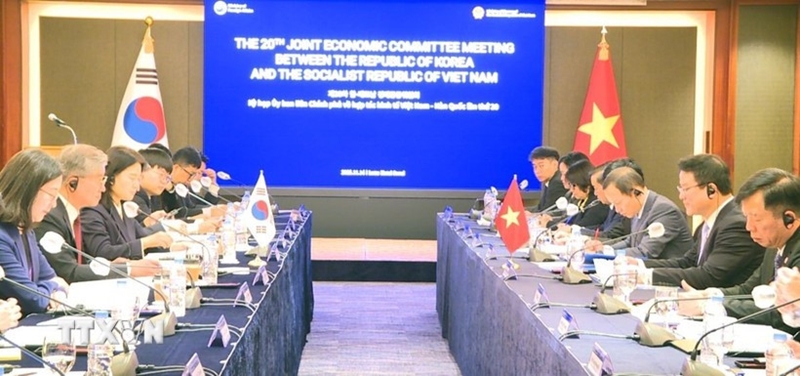The meeting was co-chaired by Vietnamese Deputy Minister of Finance Tran Quoc Phuong and Korean Deputy Minister of Foreign Affairs Kim Hee-sang.
    |
 |
|
The 20th meeting of the Vietnam - RoK Joint Economic Committee takes place in Seoul on November 14. |
At the meeting, the two sides assessed development steps in trade, investment, development cooperation, labor, economic security, energy, infrastructure, banking, science-technology, climate change and other priority areas. Both sides highlighted the substantial achievements recorded in the past time, particularly since Vietnam and the RoK upgraded their relations to a Comprehensive Strategic Partnership in 2022, noting that bilateral cooperation has expanded strongly, underpinned by mutual benefits, trust and understanding.
In trade, the RoK remained Vietnam’s third-largest trading partner in 2024 (after China and the U.S.), ranking as Vietnam’s third-largest export market and second-largest import market. Vietnam’s exports to the RoK reached 25.6 billion USD, while imports totaled 55.9 billion USD. In the first eight months of this year, bilateral trade hit 57.7 billion USD, up 7.3% year-on-year, with Vietnam’s exports rising 10.6% to 18.7 billion USD and imports down 5.8% to 39 billion USD.
The RoK is also Vietnam’s largest foreign investor. As of the end of September, Korean investors operated 10,301 valid projects with combined registered capital of 94.2 billion USD, topping both capital value and number of projects among 154 countries and territories investing in Vietnam. Korean enterprises contribute roughly 30% of Vietnam’s total export value.
Meanwhile, Vietnam has 114 investment projects in the RoK, worth 37.7 million USD, mainly in science-technology, mining, manufacturing and repair of motor vehicles and machinery.
In development cooperation, the RoK continues to designate Vietnam as a top priority partner for official development assistance (ODA). Recent commitments include 200 million USD in grant aid and 4 billion USD in concessional loans.
Labor cooperation also remains a cornerstone. More than 43,000 Vietnamese workers are currently employed in the RoK under the Employment Permit System (EPS), mainly in manufacturing, agriculture, fisheries, construction, shipbuilding and forestry. This makes Vietnam the largest EPS labor-sending country. The EPS program for 2023–2025 has yielded notable results, including Korean-language tests for about 90,000 candidates, with around 26,000 successful applicants sent to work in the RoK. The rate of workers overstaying illegally has dropped significantly to 19%, better than the target agreed by both sides.
Other labor schemes, such as the E7, E8 and E10 visas, also demonstrate strong demand from Korean employers and effective supply capacity from Vietnamese service providers and local authorities. Vietnam is currently the leading supplier of skilled workers in the RoK, with nearly 14,000 individuals employed in specialized fields.
Both sides agreed to intensify collaboration in semiconductors, telecommunications electronics, artificial intelligence (AI), quantum technology, new energy, biotechnology and nanotechnology.
They will promote joint research programs, expand technology transfer among enterprises and research institutions, develop R&D centers, train high-tech engineers, and share experience in building dynamic innovation ecosystems and policies supporting small and medium-sized enterprises.
Beyond these priority sectors, the two sides also discussed measures to resolve outstanding issues and advance cooperation in energy, infrastructure, climate response and the RoK's foreign direct investment in Vietnam.
Vietnam proposed strengthened coordination to implement the Action Plan signed in April 2025 to raise bilateral trade to 150 billion USD by 2030 in a more balanced manner. Vietnam also called on the RoK to streamline import procedures for select Vietnamese agricultural and food products.
As Vietnam enters a new development phase with the aspiration to become a high-income developed nation by 2045, the Vietnamese Government urged the RoK to encourage major Korean corporations to expand investments in priority sectors, including infrastructure development, high-tech electronics manufacturing, semiconductors, AI, renewable energy, smart cities and specialized industrial complexes along value chains.
For the 2026–2030 period, both sides will prioritize major projects in transport and urban infrastructure, high-tech facilities and higher education. They also agreed to work closely to implement projects funded by the 200-million-USD ODA grant package and framework agreements under the Economic Development Cooperation Fund (EDCF) and the Economic Development Promotion Facility (EDPF).
Vietnam further requested continued non-refundable ODA from the RoK, particularly for Phase 2 of the Vietnam - Korea Institute of Science and Technology (VKIST).
Source: VNA